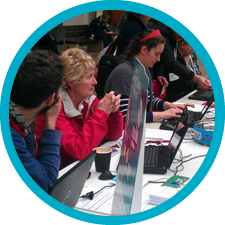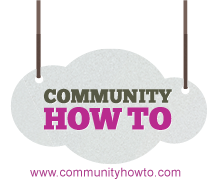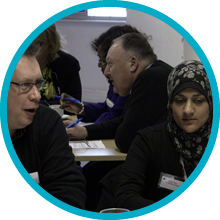Community action through digital
Working with so many local partners it’s important for us to grow how we support communities and community organisations to do more using digital technology. We’re passionate about the social impact that can only be achieved through local action and the potential for digital technology to amplify that work.
Community Hubs

In a joint project with Nominet Trust, OCF funded 31 large scale ‘community hubs’ between 1 April 2012 and 31 March 2013. Each hub aimed to build the capacity of their local communities through technology, driving social action and change. They were also charged with contributing to an online ‘hub’ to support community capacity building on a wider scale, a service now known as Community How To.
The idea for the project came from the very simple observation that whilst digital technologies have profoundly changed society and the economy across Britain, small communities and the third sector groups driving them were still trailing significantly behind the curve.
Community Hubs focussed on small communities, and used technology to improve lives, life chances and community growth. In order to capture the social and organisational impact of Community Hubs, each project worked with OCF to develop a unique evaluation framework. Between them, the projects supported c.75,000 individuals and c.2,200 organisations. The results found that social impacts for individuals (both learners and facilitators) included increased confidence (100% of programmes delivered significant changes in this area), mental well-being, social inclusion, skills, advocacy, employability and progression. Key capacity building outcomes for organisations included improved profile, communication (strongly related to the embedded use of online tools and social media), new partnerships, organisational efficiency and innovation, and cost savings.
Community How To

Also part of the Nominet Trust project, the Community How To website was launched in November 2012. It brings together top digital tools under one roof, alongside case studies of community organisations who are already putting them to good use. The website helps organisations find digital tools quickly, grouping them under common activities identified as key by community organisations, like managing projects, recruiting volunteers, and profile raising. The site was developed from the ground up with extensive consultation ensuring it met the needs of community organisations, supporting them to do more in their communities.
Since its launch, the www.communityhowto.com site now contains more than 70 digital tool recommendations, and has had more than 6,000 visitors. By registering on the site, visitors can add their own tools and case studies, leave comments and join discussions.
Having a website like Community How To with all the information in one place is a really good idea and really helpful for organisations like mine. I think something like this - a knowledge hub where people can drop in and drop out, and look for the things they need when they need them - is terrific.
Digital evolution, local action conference

The Digital evolution, local action conference, run by OCF and hosted by BT at the BT Centre in London, aimed to uncover the barriers organisations face when engaging with new online tools, and inspire change in local communities.
The conference was chaired by OCF chair and former Minister Lord Jim Knight of Weymouth, and it brought together grassroots community organisers with technologists and policy makers, offering a series of practical workshops and keynote speeches - including from Minister for Civil Society Nick Hurd MP. He stressed the importance of community organisations as the only truly trusted public intermediaries, and talked about his ‘bingo moment’ in finding out about the new Community How To website.
It’s excellent news that the voluntary and community sector are meeting challenges by embracing digital technology - and that they want to do more in this space. That’s why I want to encourage organisations to use the Online Centres Foundation’s Community How To service, which will offer them new exciting ways to inspire, involve and connect people so together they can build even stronger communities.
We heard from some really brilliant speakers and I’ve got some great ideas to take away - for instance top tips about different ways to use Twitter. It was great to meet and spend time with other community organisations, and to feel like we’re all part of a bigger picture. Everyone attending was willing to try every trick in the book - and on the internet - to do more for the people we work with.
Community Development qualification

We wanted to help people working in community development to build their skills, get recognition for their expertise and share best practice with others and so we developed our Community Development Award - a Level 3 qualification in community work delivered by OCF and accredited by NOCN.
It’s the only nationally recognised Level 3 community development qualification, and we’re enormously proud of our first 16 graduates,who were part of the first learning cohort in July 2012. The second cohort began their work in January 2013, with eight more people set to complete the qualification shortly.
The award is delivered through both face-to-face and online learning, and consists of three core units; Community Development Values and Processes, Community Group Dynamics and Social Inequality, Injustice and Diversity in Communities.
I come from a corporate background, initially the community sector was something of a shock! You need to know how to navigate it, and how to drive and direct change. That’s exactly what the Community Development course has taught me. I’ve learned how to take a step back and evaluate what I’m doing, how to recognise areas of commonality and pull together a lot of different strands into an effective whole. It’s given me confidence, a group of peers to bounce ideas off, and most importantly a professional qualification that’s already giving an edge to our new funding bids. If I could do it all over again, I would, and I’d most definitely recommend it to anyone else working in community development.